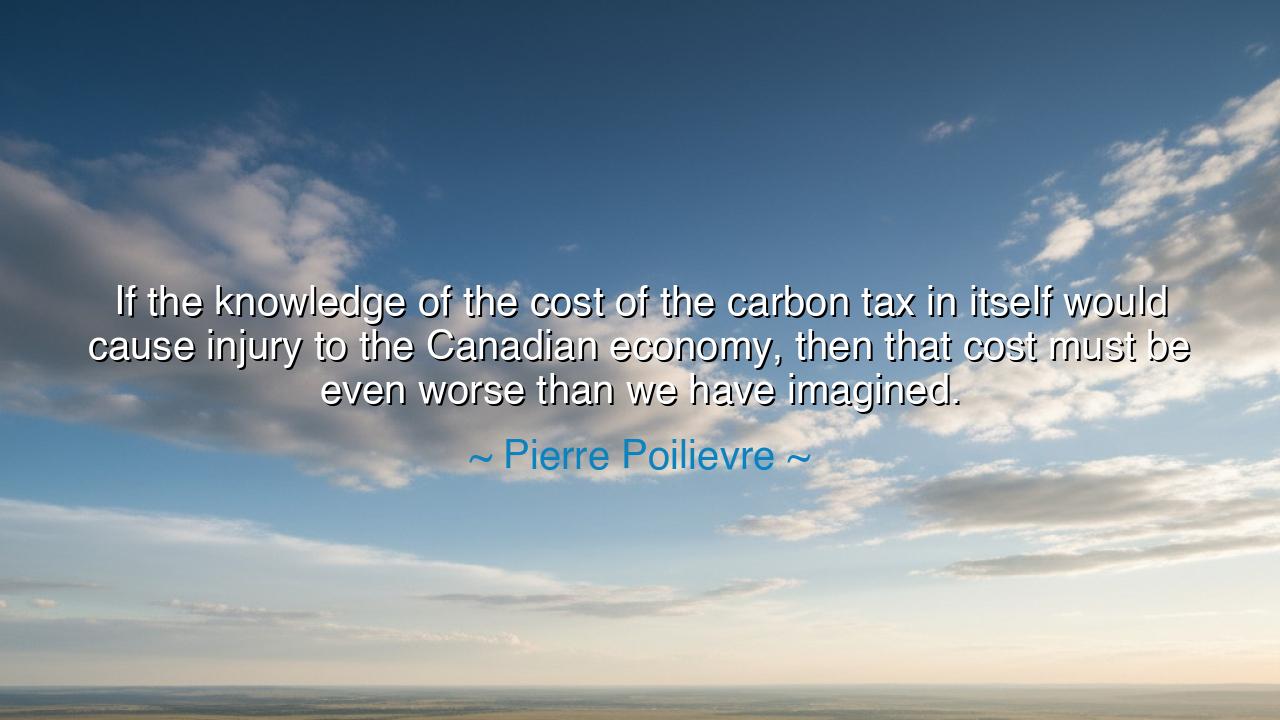
If the knowledge of the cost of the carbon tax in itself would
If the knowledge of the cost of the carbon tax in itself would cause injury to the Canadian economy, then that cost must be even worse than we have imagined.






The words of Pierre Poilievre—“If the knowledge of the cost of the carbon tax in itself would cause injury to the Canadian economy, then that cost must be even worse than we have imagined”—resound like the voice of a watchman sounding the alarm from the city walls. Beneath their sharp irony lies a truth ancient and enduring: that truth itself must never be feared, for only what is unjust or unsound shrinks in the light of knowledge. In this statement, Poilievre does more than criticize policy—he points to a deeper principle of governance and civilization: that secrecy breeds decay, and that a people’s strength lies not in the illusions they are fed, but in the realities they are brave enough to confront.
At the heart of his words lies a paradox both timeless and tragic—that those who rule often hide the full weight of their decisions, believing that the people cannot bear the truth. Poilievre’s warning is both political and philosophical. He suggests that if simply revealing the cost of a policy would itself harm the nation’s stability, then the policy is already a wound festering beneath the surface. The carbon tax, meant as an instrument of environmental stewardship, becomes in his reflection a symbol of the broader struggle between transparency and concealment, between truth that liberates and deception that enslaves. The lesson is clear: no system can endure long when its guardians fear the daylight.
Throughout history, the same pattern has repeated. The ancient Romans, when facing economic ruin, hid their debts behind the grandeur of empire, until the currency collapsed and the legions mutinied. The French monarchy, in the years before the Revolution, silenced whispers of fiscal catastrophe even as the coffers emptied and the people starved. In both cases, it was not knowledge that destroyed the realm—it was the suppression of knowledge. Poilievre’s words, though born of modern debate, echo the same eternal warning: that ignorance, especially when deliberate, is the most expensive luxury of all.
His message also speaks to the moral duty of leadership. A leader, if he is just, must never fear the truth; for the truth, though harsh, is the forge of wisdom. When rulers conceal, they betray their covenant with the governed; when they reveal, even at the risk of pain, they honor the sacred bond of trust. In this sense, Poilievre’s critique transcends the particulars of Canadian politics and enters the realm of universal law: that accountability is the soul of democracy, and that a nation cannot walk safely in darkness. If the revelation of cost is dangerous, then the danger was born not in the revelation, but in the decision itself.
The imagery of his words also reminds us of the prophets of old, who cried out against the rulers who dressed corruption in fine words and called oppression by noble names. To them, truth was not a weapon, but a cure—painful, yes, but necessary for healing. So too does Poilievre’s statement cut through the rhetoric of policy to expose a deeper illness: the tendency of governments to protect themselves from scrutiny while proclaiming benevolence. His logic is piercing—if honesty itself is perilous, then deceit must already reign. For no righteous act fears examination, and no just law requires the veil of silence.
We may also read his words as a broader parable for our own age, when information is both a power and a peril. In an era where facts are bent by politics and truth is treated as a weapon, Poilievre’s observation becomes a moral compass. Whether one agrees with his stance or not, the wisdom remains: a people that cannot face the truth of its own choices will one day be crushed by their consequences. The lesson extends beyond carbon taxes or economics; it reaches into every sphere of life—personal, civic, and spiritual. To know the truth, even when painful, is the first step toward freedom.
Thus, the lesson that arises from this quote is both practical and profound: never trust a system that fears disclosure, and never accept comfort in place of clarity. Demand light where there is shadow, and reason where there is rhetoric. For the health of a nation—like that of a soul—depends not on the absence of difficulty, but on the presence of honesty. If truth threatens collapse, then it is not truth that is dangerous, but the fragile edifice built upon lies.
So let these words be remembered by future generations: that the cost of concealment is always greater than the cost of confession. Let every citizen, every leader, and every age remember that to govern wisely is to speak truthfully, and to hear truth without fear. For in the end, it is not the revealing of cost that weakens a people—it is the refusal to know it. And only those who dare to look upon the truth, even when it wounds, shall ever have the strength to heal.






AAdministratorAdministrator
Welcome, honored guests. Please leave a comment, we will respond soon